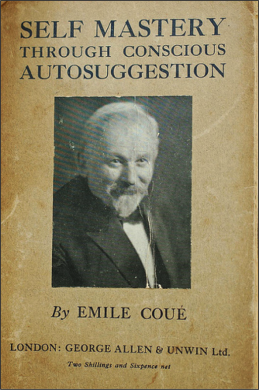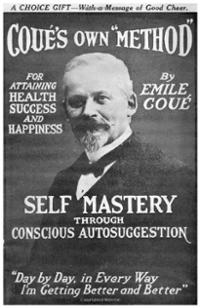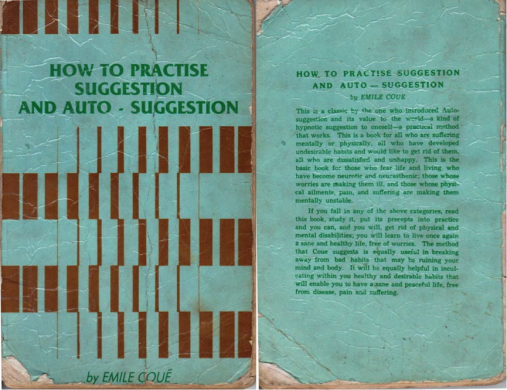Autosuggestion is an instrument that we possess at birth, and in this instrument, or rather in this force, resides a marvellous and incalculable power. Émile Coué
Émile was born in 1857 and helped many people to develop their inner strength.
A French psychologist and pharmacist, he pioneered self improvement through optimistic self talk and autosuggestion. This approach became increasingly popular from the 1920s onwards.
Today many people recognise the concepts of positive scripting, mantras or affirmations. Sometimes these notions can be parodied, of course, with the image of a person standing in front of a mirror telling themselves they are wonderful.
There is validity in such concepts, however, if a person is able:
To have a positive attitude.
To have the ability to reach a specific goal.
To have the resilience to reach the goal.
The second of these three conditions is crucial. The person must have the ability to reach the goal. It must be within the scope of their controllables.
Coué’s work brought something new to psychology, however, so let’s explore more about his approach.
Émile grew up in Brittany, did well at school and went on to further studies.
Initially he trained as a chemist, but was forced to take another route because of financial pressures on his parents. He managed to switch studies, however, and eventually gained a degree in pharmacology.
He worked in an apothecary at Troyes from 1882 to 1910. Whilst believing in the benefits of medication, he found that patients often fared better when he emphasised the likelihood of success.
Émile became known for writing positive notes that accompanied the prescription. The patient expected the medicine to work and this became a self fulfilling prophecy.
Impressed by the results, Emile began studying hypnosis. After a while, however he focused more on what he called autosuggestion, a form of self hypnosis.
This led to him producing the book Self Mastery Through Conscious Autosuggestion, which was published in the UK in 1920 and the United States in 1922.
The Coué Method emphasised the Law of Concentrated Attention. The Law states that:
Whenever attention is concentrated on an idea over and over again, it spontaneously tends to realise itself.
Coué believed that each person had the solution to their own problems with them. He said:
“You have in yourself the instrument of your cure.”
This could be achieved through the process of autosuggestion – sometimes called applied conditioning.
The original practice he advocated now seems simplistic, but many individuals found it effective. It involved them repeating in a monotonous voice many times each day:
“Every day, in every way, I am getting better and better.”
The method evolved, however, and involved a person choosing:
To focus on a positive – rather than negative – outcome. For example, “I am going to be healthy,” rather than, “I am not going to be sick.”
To choose a positive mantra and, in some cases, a positive image.
To keep repeating the positive mantra or focusing on the positive image.
Émile believed that if a person kept repeating certain words or focusing on certain images, these became part of their subconscious. This would channel their energy towards achieving their desired goal.
People were reprogramming themselves – developing a mental model or belief system – in a way that improved their chances of success.
This approach was obviously built on in later years by people such as Norman Vincent Peale, Albert Ellis and many others including, for example, sports psychologists.
Émile encouraged people to plant positive seeds in their minds, rather than negative seeds. He believed in the power of imagination to envisage and achieve success. He reaffirmed this by saying to people, for example:
“You will do what has to be done, nourished by the joy and happiness of being alive.”
Time and again Émile stressed to patients that he had no healing power. They were masters of their own destinies. They could shape their thoughts and therefore, to a large extent, shape their futures.
As mentioned at the beginning, it is worth underlining one key point about autosuggestion. The person must have both the attitude and ability to achieve their goals.
Nevertheless, it is well worth revisiting Émile work. He died in 1926, but many of his ideas still flourish. He encouraged people to channel their inner strength to achieve success.
Here is a link that provides some insight into Émile’s method of working.









Why does it work for some people and for others it simply does not? Is it the fact that having a genuine, authentic belief or faith in a thing that makes it happen when having this slightest, hidden consciousness that it will not work causing it not to be so?
This is a quote from above….same article
“ As mentioned at the beginning, it is worth underlining one key point about autosuggestion. The person must have both the attitude and ability to achieve their goals.”
The reason that it works for some and not others is their personality type. Their is a good book called Nomads, settlers and warrriors by Terence Watts a hypnotherapist that train me. It explains the three types. Settlers are suggestible,(chatty sociable types), as are nomads ( extroverts) but warriors are not so easy and they can often be determined by a turned down mouth even when they smile and they are generally strong willed. Usually warriors have to be tricked into hypnosis. Hope this helps.
I will rather search into the concept of psychological reversal used by EFT. It means that the person has a hidden interest in remaining the way he is or get a secondary advantage in getting sick such as avoiding a painful situation etc.
Some people also simply do not want to live.
[…] we use optimistic expectations by saying to ourselves something like, “Day by day in every way, I’m feeling […]
[…] Affirmations are a newer practice in the realm of spiritualism. They are thought to have stemmed from a man named Emile Coue. Coue was a French psychologist who used optimistic suggestions with his patients. […]
Autosuggestion is the things you tell yourself.The thought you think good or wrong go to your subconscious and effect your way of what thoughts you think.
A couple of things, if you have deep-seated doubts that it CAN work, it perhaps won’t as your subconscious mind is receiving two conflicting instructions, namely – achieve this result and you can’t achieve this result – so the two negate each other.
Also Coue’s book stresses that one use the imagination WITHOUT the “will”.
In other words if you are trying to “force” a result thru force of will, it probably won’t work. I believe actually for the same reason – if you believe something requires “an act of will”, you clearly believe it is very difficult to achieve and the instruction “this is very difficult to achieve” is what the subconscious will “get”.
Again, this poses a conflicting and negating instruction to the subconscious. Instead, tell yourself, “this will happen easily”.
No great force of will required.